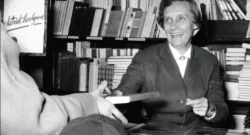Author: Tamara Mrázová
Best cottage cheese recipes you need to try
Do you eat cottage cheese? This dairy delicacy is a staple in the daily diet of many Slovaks. Many of us enjoy it simply with vegetables or bread. It might not occur to many, but this protein-rich mix is a perfect ingredient in the kitchen. We can incorporate it into our cooking, baking, and grilling, and serve it both sweet and savory. Let’s take a look at a few recipes that will enrich your menu not only in the summer. Herb Cottage Cheese Patties For these simple and delicious patties, you will need 300g of cottage cheese, 100g of finely chopped tomatoes, 50g of fresh spinach, Parmesan, and if you have any at home, fresh herbs that you can finely chop. Mix all these ingredients together in a bowl. You will get a mixture to which you then add 75g of semolina flour. Each cottage cheese has its specific consistency and different water content. Therefore, if the dough is too thick after this step, you can add a little milk. In the next step, heat olive oil in a pan and fry the patties over medium heat. The size of the patties is up to each and every one of the cooks. Fry until golden on each side and transfer to a plate. The patties are full of flavor, so they can be served on their own without any sides. However, you can also garnish them any way you like. Cottage cheese brownies After the savory patties, let’s move on to sweet, protein-packed brownies. For this recipe, you will need: Dry ingredients: 2 cups of semolina flour 1 teaspoon of baking powder 1/2 teaspoon of salt 2 tablespoons of cocoa powder 1/2 bar of baking chocolate Chocolate chips Wet ingredients: 1 package of cottage cheese 3 eggs 1 banana 1 tablespoon of honey A few drops of vanilla extract Preheat the oven to 180 degrees Celsius. Melt half of the chocolate in a double boiler, stirring regularly. While the chocolate is melting, blend the cottage cheese, eggs, banana, honey, and a few drops of vanilla in a mixer until you have a liquid mixture. Gradually add the flour, baking powder, cocoa powder, and salt, mixing well. Once the mixture is ready, prepare your baking tray by greasing it and dusting it with flour. Pour the batter into the tray. If available, feel free to sprinkle with almond flakes and add small pieces of chocolate. Bake for approximately half an hour. Cottage cheese egg spread To ensure we don’t stick only to cooking and baking, let’s finish with a very simple recipe for an egg spread that we can enhance with cottage cheese. For its preparation, we will need 2-3 hard-boiled eggs, one package of cottage cheese, garlic, smoked paprika, salt, and basil. The process is really simple, as all these ingredients just need to be finely chopped and mixed together in a bowl. If you want an even smoother consistency, you can blend the spread to eliminate any lumps. Serve with fresh bread and vegetables. Enjoy your meal!
The best recipes from carrot for summer
As summer arrives, we often crave lighter dishes on our plates. Many of us swap pastries and meat dishes for vegetable-based meals. In today’s article, the star of the show will be carrots, which many of us enjoy for their flavour. In addition to its beautiful vibrant colour, carrots are rich in vitamins B, C, D, and E. They contain pectin, which serves as nourishment for beneficial bacteria found in the colon, thereby supporting the maintenance of a healthy gut flora balance. Carrot soup Have you ever considered that besides the classic broccoli and spinach, which most of us have tried, carrots can also be the main vegetable in our soups? To prepare it, you’ll start with one onion, a clove of garlic, olive oil, and seasonings to taste. In a pot, sauté this mixture and add diced carrots, about half a kilogram. Once everything softens, blend it and add broth. It’s best if you keep a bit of broth after Sunday’s lunch and let it sit in the fridge for two days. After this step, all that’s left is to let everything simmer beautifully and taste it. A secret tip to give the soup a wonderful rich flavor is to add cumin right at the end. Serve it with toasted bread or sunflower seeds. Carrot jam Yes, you read that right, we can prepare carrots in a sweet way too. Besides the well-known carrot cake, we introduce carrot jam. For its preparation, you’ll need just one kilogram of carrots, lemon juice, and sugar according to your preference, typically between 500 to 800 grams. The process is really simple. First, prepare a sugar syrup with half a liter of water and sugar, melting it in a pot. Remember to stir the mixture regularly. Then, add the lemon juice. Finally, add finely grated carrots and let it simmer for at least 30 minutes, stirring occasionally. Once the jam is ready, divide it into sterilized jars, seal tightly, and turn them upside down. These final steps are similar to preparing any other fruit jam, but our star ingredient here is carrots! Carrot fries with agave Although there are many great carrot recipes out there, a lot of them can be quite complicated. It’s worth remembering that classic roasted carrots make a fantastic side dish for various meals. To make the best carrot fries, start by cutting carrots into matchstick shapes and boiling them in water for 10 minutes. Then, coat them in cornstarch and add coarse salt. Bake these prepared fries in the oven at 200 degrees Celsius. If you prefer to keep things simple, serve the fries as they are. For a taste adventure, try drizzling them with agave or rice syrup before serving.
Singer Alya: It’s not just about singing, you must be a complete product, a complex persona
The Slovak singer Angelika Kollmannová performs under her stage name Alya. She became passionate about music at an early age, finding her idols all around her. Her parents are well-known Slovak musicians, and she discovered her own singing talent as well. In an interview, she told us about her participation in the competition Superstar, interesting aspects of the Slovak music industry, and what it’s like to work in show business. She revealed how her journey began and where she hopes to go in the future. How did you get into singing? I always say that I didn’t even have a chance not to get into singing. (laughs) My parents met in a band, later separated, and still perform as a musical duo to this day. Music was always important in our home. We all play a musical instrument. Sometimes, when I’m falling asleep, I hear my dad getting into a jazz mood and playing. Sometimes he even does it in the morning instead of my morning alarm 🙂 I started playing the piano in first grade, but I never enjoyed the theory classes. To this day, I’m not exactly friends with sheet music. I can play what I need, but I wouldn’t call myself a virtuoso. Along with the piano, I took singing lessons. Suddenly, during my teenage years, music and singing became my place of comfort, where I could express everything I felt. My therapist helped me realize that music is actually a self-healing gift for me, one that heals my wounds. “I lost myself and was searching, but I always found myself in music.” What inspires you when it comes to music? Since I was little, I wanted to be the Slovak Hannah Montana, just without the blond wig 🙂 I liked the life she lived. I knew that I wasn’t born for the stereotypical life either. Almost anything can inspire me. I can even get excited about any word I hear on the radio. I write it down and then incorporate it into my lyrics. Certainly, my parents also motivate me, who even after their 50s can handle several hours of intense concerts without any problems. One day I would like to achieve what they have. But only when I grow up 🙂 How was your experience on Superstar? I always had it in my mind that if I wanted to succeed in pop music in Slovakia, I had to participate in Superstar. I was afraid that if I didn’t win, I would never accomplish anything in music. However, my confidence crumbled like a house of cards there. I wasn’t in the right mindset, and it didn’t help my mental state, and so, I left devastated, and for several months afterwards, I couldn’t even make music. I didn’t believe in myself. “Every experience is good for something, but in Superstar it was not easy for me at all.” What gave you the boost then? It was in Superstar that I met a great girl named Erika, who was performing under the production of Illuminate. At that time, they were holding a competition to find new singers. At first, I didn’t even want to apply because my failure in Superstar demotivated me. In the end, I finally gathered the courage and sent them a video of me singing at the last minute. The next day, I got a message from them saying that I made it to the TOP 3. That’s how I got into Illuminate and started creating with them. I was lucky to have my producer Max Mikloš. The whole team is incredible. Our cameraman, PR manager, and even our big boss 🙂 We have great relationships with other artists like Yaek and Tian Moon. We are like family. I was a surprise even to my parents. They knew I enjoyed music, but when I told them I was going to the studio to record my own songs, they were speechless. When they listened to my first song, it moved them to tears. What surprised you the most about the music industry? It’s not just about singing. You must be a complete product, a whole complex persona. Everything is hidden in your expression. I feel that nowadays people are more interested in scandals and dramas on social media than in genuine, artistic content. Therefore, if you try to present yourself only through your work, it is a bit more difficult to gain attention and break through. Despite this, I decided to take the slower but more conscientious path. Everything is very closely connected with social media and the mutual promotion that we exchange with other singers. “The music industry is ruthless. If you can’t adapt, they will choose foreign performer instead of you.” What bothers you the most about show business? The only thing that really bothers me is when some musicians act superior to others. This usually happens when someone achieves instant success in something. For example, when they record a new song that suddenly becomes very popular, or they suddenly gain a lot of new followers. That fame seems completely artificial and unjustified to me. We are all equal, and I don’t see any reason why we should treat each other differently. What can we look forward to in your upcoming work? This summer, I’m planning to perform concerts and entertain you with my music. In the fall, I’ve set a goal to release something big, some larger project. Although I already have material for my first EP, I’d like to create something fresh and start from scratch. I believe I can achieve this within this year. I’ll be delighted if you join me on this journey. Alya’s Instagram: https://www.instagram.com/angelikakollmannova/
The best zucchini recipes for summer
In the summer, our taste buds crave refreshing and light dishes that not only satisfy our stomachs but also keep us hydrated and full of energy. Zucchini, with its delicate flavor and high water content, is an ideal ingredient for summer recipes. This vegetable not only adds lightness to the meal but also enhances its nutritional value. It is rich in fiber and vitamins A, C, and K. In this article, we’ll explore some simple and refreshing recipes where zucchini stays under limelight. Zucchini spaghetti Did you know that zucchini can be a great substitute for traditional pasta? You’ll save hundreds of calories, and it’s super easy to make. Slice the zucchini into thin strips. If you have a spiralizer, you can use it to turn the zucchini into spaghetti-like noodles. Next, heat some olive oil with garlic in a pan and add the zucchini. Sauté for about 2 minutes until the zucchini softens and releases some of its water. Take the mass off the heat. Your “pasta” is now ready, and you can add any sauce you like. Some of the best combinations include blue cheese sauce, pesto, or a classic tomato sauce. Zucchini bread Craving a moist cake in a healthier version? This bread will definitely hit the spot. To prepare this bread, start by grating one large zucchini. However, be careful as grated zucchini releases a lot of water, which needs to be drained. In a bowl with the grated mass, add 250 g of whole wheat flour, 3 teaspoons of baking powder, 1 teaspoon of salt, and, optionally, a few cloves of garlic. In another bowl, whisk together 4 eggs and 85 ml of oil. Next, combine both mixtures and stir in 115 ml of sour cream, seasoning with salt and spices to taste. Once poured into a baking dish, the bread can be decorated. Depending on preferences, you can add cherry tomatoes, olives, or rosemary to the top. Bake at 180 degrees Celsius for 40 to 50 minutes. Zucchini soup with parmesan cheese For this light and creamy soup, you’ll need 3 large zucchinis, sliced and sautéed in oil with onions and garlic. Pour in broth and simmer for 20 minutes. Then, blend the mixture to a smooth consistency and stir in whipping cream. Bring the soup back to a simmer and season to taste. Add Vegeta seasoning, dried basil, salt, and black pepper. Serve in bowls, generously sprinkled with Parmesan cheese to enhance its flavor. If you haven’t been a fan of zucchini so far, we’re confident that with these tips, you’re ready to add it to your summer menu.
July, a plastic-free month
Plastic is a synthetic material that is used in many aspects of modern life. It is made of various organic polymers, including nylon, PVC, and polyethylene. Due to its cost-effectiveness, resilience, and adaptability, it is widely used in a variety of industries, including construction, packaging, automotive, and healthcare. Plastic has transformed several aspects of daily life, but it also represents serious health and environmental issues that require attention. The Rise of Plastic The history of plastic began in the early 1900s when Belgian chemist Leo Baekeland created Bakelite. As the first real synthetic plastic, it paved the way for a revolution in materials science. Plastic’s use in consumer goods and mass production saw a boom in production following World War II. Plastic is used in everything these days, from water bottles and grocery bags to cell phones and medical equipment. Plastic’s versatility is one of its main benefits. It can be produced in a variety of colours, moulded into almost any shape, and made as flexible or rigid as required. It is essential in many applications because of these qualities. For example, syringes, implants, and sterile packaging in the medical industry are all made of plastic. Environmental impact Plastic has a negative side despite all its advantages, mostly because of its environmental impact. Plastic remains a persistent pollutant despite being useful due to its durability. The following are some of the main issues that plastic brings to the environment: Non-biodegradability: The majority of plastics decompose into smaller particles known as microplastics rather than breaking down naturally. These have the ability to persist in the environment for centuries, building up in the soil, rivers, and seas Chemical Release: Harmful chemicals, such as endocrine disruptors, can be released during the production and degradation of plastics. Both ecosystems and human health may be negatively impacted by these substances. Resource Consumption: Fossil fuels are largely used in the energy-intensive and resource-dependent production of plastic. This aggravates climate change by increasing greenhouse gas emissions. Moving towards sustainability By addressing the environmental impacts, plastic may not be the same in the future. Already, there are some approaches that connect this material and sustainability: Recycling: Reducing the quantity of plastic waste can be achieved by increasing recycling rates and technology. More creative ways to recycle plastics are being developed; one such way is chemical recycling, which separates polymers into their monomers so they can be reused. Reduce and Reuse: One way to drastically reduce plastic waste is to encourage the use of reusable alternatives while minimizing the use of single-use plastics. Policy and incentive support, along with consumer behaviour, are key factors in this change. Policies and Laws: To control the production and waste of plastic, governments all over the world are putting laws into place. Bans on single-use plastics, incentives for using recycled materials, and enlarged producer responsibility plans are some of the measures being adopted. Biodegradable Plastics: Studies are being conducted to create plastics that decompose more quickly in the environment. Renewable resources are the source of biodegradable and compostable plastics. How can you reduce the use of plastics? Reducing the use of plastics in a household involves making conscious choices and adopting sustainable alternatives. Here are some practical steps to help minimize plastic use: Reusable bags and containers Use cloth or other reusable bags. Opt for mesh or fabric produce bags for fruits and vegetables. Replace plastic storage containers with glass, stainless steel, or silicone options. Avoid single-use plastics Use a reusable water bottle made of stainless steel or glass. Carry a reusable coffee cup for your to-go coffee. Use metal, bamboo, or silicone straws instead of plastic ones. Personal care products Switch to bamboo toothbrushes. Use shampoo bars and soap bars instead of bottled products. Choose a safety razor with replaceable blades instead of disposable razors. By implementing these changes, you can significantly reduce the footprint of your household and contribute to a healthier environment. Plastic has changed modern living with its unmatched convenience and inventiveness, but its effects on the environment cannot be overlooked. The difficulty lies in finding a balance between the advantages of plastic and its environmental impact as society grows more conscious of the need for sustainability. We can work toward a future where plastic continues to serve its essential functions without endangering the health of our planet by combining efforts in recycling, innovation, and policy. The article was written in collaboration with Lea Kovalská.
A Complete Guide: Everything You Should Know Before Leaving on Vacation
One of the greatest pleasures in life is taking a vacation; it’s a chance to unwind, discover new places, and make priceless memories. But occasionally, the expectation can eclipse the essential planning, resulting in needless tension and inconvenience. Before you depart for your vacation, keep these important points in mind to guarantee a trouble-free and enjoyable journey. Keep Your House Safe Make sure your house is secure and safe before leaving. Here’s how to do it: Lock All Windows and Doors: Make sure that all openings are firmly shut. Install a Security System: Ensure that your home security system is turned on if you have one. If not, think about installing temporary security cameras. Notify a Reliable Neighbour: Give your neighbour advance notice of your absence so they can watch over your property. Hold Mail and Deliveries: To prevent obvious indications that your home is unoccupied, make arrangements for your mail and any anticipated packages to be held or picked up by a neighbour. Itinerary and Travel Documentation Travel documents are essential for a smooth trip. Make sure you possess: Valid Passport and Visas: Make sure your passport is up to date and get any required visas well in advance. Boarding passes and tickets: Ensure you have printed or digital versions of your bus, train, or airline tickets. Details of Your Accommodation: Make a list of all the hotel reservations you make, including the addresses and phone numbers. Travel Insurance: Verify that you have sufficient coverage for unexpected medical expenses, lost luggage, and cancellations. Safety and Health Measures Your safety and well-being ought to come first. Remember to: Essential Medication Pack: Include a copy of your prescriptions and enough medication for the next few days. Basic first aid: supplies like band-aids, antiseptic wipes, painkillers, and any specialized items you might need should be included in your first aid kit. Immunizations and Health Safety Measures: Make sure you find out well in advance if you need to take any additional health precautions or vaccinations for your destination. Clever Packing Your travel experience can be made or broken by how you pack. Think about these suggestions: Weather-appropriate Clothes: Check the local meteorological conditions before leaving and pack appropriately. Size Of Toiletries: Use travel-sized versions to save space, and keep in mind that limited amount of liquids can be brought on board of a plane. Comfort and Entertainment: Pack comfortable travel accessories like headphones, neck pillows, and books or e-readers. Chargers: Carry chargers for every gadget you own along with a travel adapter in case the outlets at your destination are different. Making Financial Arrangements Make sure you can access funds and handle your money well: Notify Your Bank: To prevent having your cards blocked for questionable activity, let your bank know about the dates and locations of your travels. Various Payment Options: To cover all situations, keep a variety of cash, credit, and debit cards on you. Currency exchange: Before you depart, exchange some cash for small local purchases. Communication Strategy Maintain relationships with those you love and get the information you need: International Phone Plan: Find out about international phone plans from your mobile provider, or think about purchasing a local SIM card when you get there. Emergency Contacts: Keep a list of people to call in case of emergency, along with the local emergency number and the embassy’s contact details. Last-Minute Checks Before Leaving Do a last sweep before leaving the room: Electronics: They should be unplugged in order to conserve electricity and lower the possibility of electrical problems. Trash and Perishables: Get rid of your trash and perishables to keep pests and bad odors away. Set Thermostats: To conserve energy while you’re away, adjust your thermostat. A happy traveler is one who is well-prepared. You can create the conditions for a stress-free and enjoyable holiday by taking the time to secure your home, gather the required paperwork, plan for communication, pack sensibly, prepare for health and safety, and perform last-minute checks. Happy journeys from our editorial staff! The article was written in collaboration with Lea Kovalská.
Pioneer of children’s rights and famous author Astrid Lindgren
What comes to mind when you hear the name Pippilotta Delicatessa Windowshade Mackrelmint Ephraim’s Daughter Longstocking? Endless pages of a children’s book that brought true magic and curiosity into our childhoods. Many of us remember eagerly turning page after page along with her monkey, Mr. Nilsson. Do you remember which author stands behind the character of this nine-year-old girl with a unique appearance and unconventional behaviour? It was Astrid Lindgren herself who brought this beloved book into our libraries. At first glance, she may seem like just an ordinary writer, but the truth is quite the opposite. Who was Astrid Lindgren? She was born in 1907 on a farm in Sweden but spent nearly her entire life in the capital city of Stockholm. After an unfortunate romance that resulted in pregnancy, she gave birth to her first son in Copenhagen. Due to financial difficulties, she had to give him up for foster care. However, a few years later, when her life situation improved, she could finally take him back. After this unsuccessful romance, she later on got married, and two years into her marriage, she and her husband had a child. Their daughter, Karin, became the main inspiration for Astrid’s work. “I write to entertain children, and I want to amuse the child within me, too.” Pippi Longstocking In 1941, Astrid decided to write a book about a curious girl who thrives to discover our world. Astrid did it specifically for her daughter, who was ill at the time, to entertain her. While writing, she looked at the story through children’s eyes, and the character’s nature thus resonated with hundreds of thousands of young readers who got a chance to read the book. Pippi wasn’t afraid to be different. She slept with her feet on the pillow and her head under the covers. Astrid showed that doing things differently, in one’s own way, doesn’t mean doing them wrong. Even though Pippi was just a nine-year-old girl, she had such strength that she could even lift a horse. She was successful The book was translated into more than 60 languages from its first edition and continues to enjoy immense popularity to this day. Astrid received the Hans Christian Andersen Award, considered the highest possible honor for authors of children’s books. The stories of Pippi Longstocking have been adapted into numerous films, television series, and theatrical plays. The most famous is the Swedish television adaptation from 1969-1973, where the main character was played by Inger Nilsson. “Life is something you have to take care of. Don’t you realize that?” Astrid was a rebel As she herself often stated, Astrid didn’t want to bend to rebellion. In her works, she broke societal standards, creating a new image of independence. Even Pippi herself was a feminist. Astrid hid everything that couldn’t be openly discussed between the lines. Pioneer of rights Astrid actively fought for children’s and minority rights. She respected diversity and physical punishment of children, which was common at the time. She believed that every child has the right to feel loved, protected, and safe. For her efforts, she received the Right Livelihood Award in 1993. Growing up on a farm gave Astrid a close connection to animals. Thanks to her efforts, she managed to change the farming system in Sweden, pushing the country to one of the most progressive positions in agriculture at that time. Because of her, animals suffered less and lived in more humane conditions. What a throwback Do you remember how did the famous story start? “On the outskirts of a tiny little town was a neglected garden. In the garden stood an old house, and in that house lived Pippi Longstocking. She was nine years old, and she lived there all alone. She had no mother or father, which was actually quite nice, because it meant that no one could tell her that she had to go to bed just when she was having the most fun. And no one could make her take cod liver oil when she would rather eat sweets.” “I am frecklier and more beautiful than ever. If it carries on like this I’ll be downright irresistible.” – Pippi Longstocking
Do you know what benefits meditation offers?
Meditation is an ancient practice rooted in various cultures and spiritual traditions. In recent decades, its popularity has steadily grown. More and more people are turning to meditation as a way to reduce stress, improve their mental and physical health, and find inner peace amidst the hustle and bustle of modern life. Meditative practices can be done sitting, lying down, or in motion, and its duration can vary, from a few minutes to several hours. While there are many different techniques and approaches to meditation, they all share a common goal: achieving a state of inner peace, relaxation, and releasing tension in the body. “Meditation nourishes our mind as food nourishes our body.” – Dalai Lama Benefits of meditation Stress Reduction: Meditation is known for helping to reduce stress levels. The meditative process decreases the production of stress hormones like cortisol, which can help with managing anxiety and tension. Better of Focus and Concentration: Regular meditation strengthens the ability to focus and maintain attention. Numerous studies indicate that meditation can enhance cognitive functions and increase a person’s ability to sustain attention for longer time. Better Emotional Health: Meditative practices can contribute to better emotional balance and mood enhancement. For example, specific techniques like mindfulness meditation help develop a more positive outlook on life and increase self-acceptance. Better physical health: Meditation can have a positive impact on physical health, including reducing blood pressure, improving sleep quality, and strengthening the immune system. It can also prevent one’s body from symptoms of chronic conditions such as headaches and migraines. Better Self-Awareness : Meditative practices fosters deeper self-awareness and awareness of one’s thoughts, feelings, and behaviours. This phenomenon can lead to better decision-making, personal growth, and increased overall life satisfaction. Here are some facts you might not have known: First Mention: The oldest written records of this ritual dates back to around 1500 BCE, originating from India. Brain Changes: Research indicates that regular meditation can alter the brain’s structure. For instance, meditation may increase grey matter in areas of the brain associated with memory, learning, and empathy. Cultural Differences: Meditation is practiced in various ways around the world. For example, in Tibet, it is often associated with visualisation and chanting, whereas in Japan, emphasis is placed on sitting in silence and breath practices. Impact on HIV: Studies have shown that meditative practices positively influence and slow the progression of HIV. People who meditate regularly are able to produce higher levels of lymphocytes, which are crucial for patients suffering from HIV. There is no one-size-fits-all manual: To experience the benefits of meditation, you don’t need to follow any specific guide. Meditative practice is meant to enrich you, and you should practice it in a way that grants you its beneficial effects. Feel free to change it into what suits you best. “Meditation is not a way of making your mind quiet. It’s a way of entering into the quiet that’s already there—buried under the 50,000 thoughts an average person thinks every day.” – Deepak Chopra







